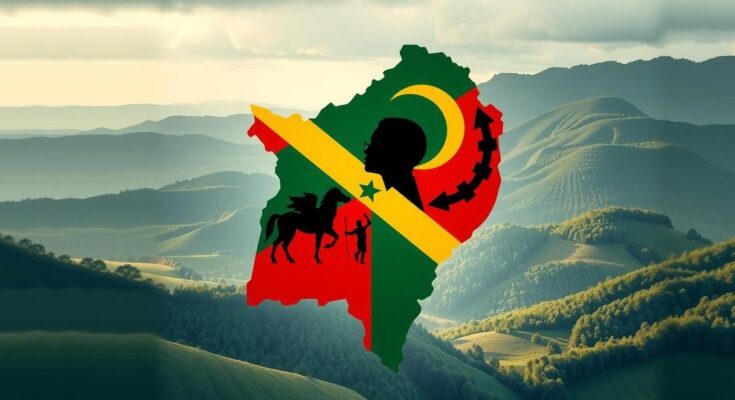President Félix Tshisekedi of the DRC has pledged a vigorous military response to the advancing M23 rebels who have taken Goma, condemning them as terrorists. His address highlighted the international community’s inaction amid a worsening humanitarian crisis, with over 500,000 displaced individuals. Regional leaders have called for dialogue, but tensions between Rwanda and South Africa are escalating due to allegations regarding the rebels. Angola seeks to mediate renewed discussions to address ongoing conflicts in the region.
President Félix Tshisekedi of the Democratic Republic of Congo has publicly committed to a robust counter-offensive against the M23 rebel group, which has taken control of Goma and is advancing to seize further territory. In a televised speech, he labeled the rebels as “terrorists” and emphasized the need for a coordinated and vigorous response to restore government authority in the eastern region. He criticized the international community for its lack of action amid the ongoing crisis, highlighting the urgent need for support.
The M23’s actions have exacerbated a severe humanitarian crisis, displacing approximately 500,000 individuals, eventually leading to shortages of food, water, and electricity in affected areas. The fight has attracted international attention and pressure, as the UN reports a growing humanitarian disaster. Moreover, Tshisekedi called for unity among Congolese people to bolster military efforts in reclaiming control from the insurgents.
In an East African regional summit called by Kenyan President William Ruto, Tshisekedi declined to participate, despite calls urging the DRC government to negotiate with the M23 and other armed factions. The summit aimed to explore peaceful conflict resolutions. Tshisekedi acknowledged the contributions of South African and UN forces in the struggle against the rebels, as tensions have escalated between South Africa and Rwanda amidst allegations surrounding the conflict.
Tensions between South Africa and Rwanda rose significantly following remarks from South African President Cyril Ramaphosa regarding Rwanda’s involvement with M23 forces. President Paul Kagame of Rwanda responded sharply, questioning South Africa’s stance as a mediator and indicating Rwanda’s readiness for confrontation if necessary. This exchange signifies the deteriorating relationship between the two nations, which has faced challenges in recent years.
Angola has urgently called for talks between the DRC and Rwandan leaders, stressing the need for renewed discussions regarding M23 and other armed groups within the region. Angola’s previous mediation attempts have faltered, and Tshisekedi’s recent visit aims to explore future steps within the framework of these ongoing diplomatic efforts. Previous initiatives led by the East African Community and Angolan mediation have failed to yield a lasting peace solution.
The ongoing conflict in the eastern Democratic Republic of Congo has a complex history, primarily involving armed groups such as the M23, which are widely believed to have backing from neighboring Rwanda. The DRC has faced instability and humanitarian challenges for decades, exacerbated by repeated cycles of violence and regional tensions. The current situation has prompted international actors to call for cooperative measures to address the conflicts and prevent further humanitarian crises. Understanding this historical context is crucial for comprehending the dimensions of the current conflict and the responses by various nations and regional organizations.
In conclusion, President Félix Tshisekedi has vowed to take a decisive stand against the M23 rebels in Goma, emphasizing military action and national unity against perceived threats. The ongoing humanitarian disaster has called for international attention and dialogue among regional leaders to resolve the escalating conflict. Tensions between Rwandan and South African leaders further complicate the situation, highlighting the fragile stability in the region amidst ongoing efforts for peace negotiations.
Original Source: www.bbc.com




